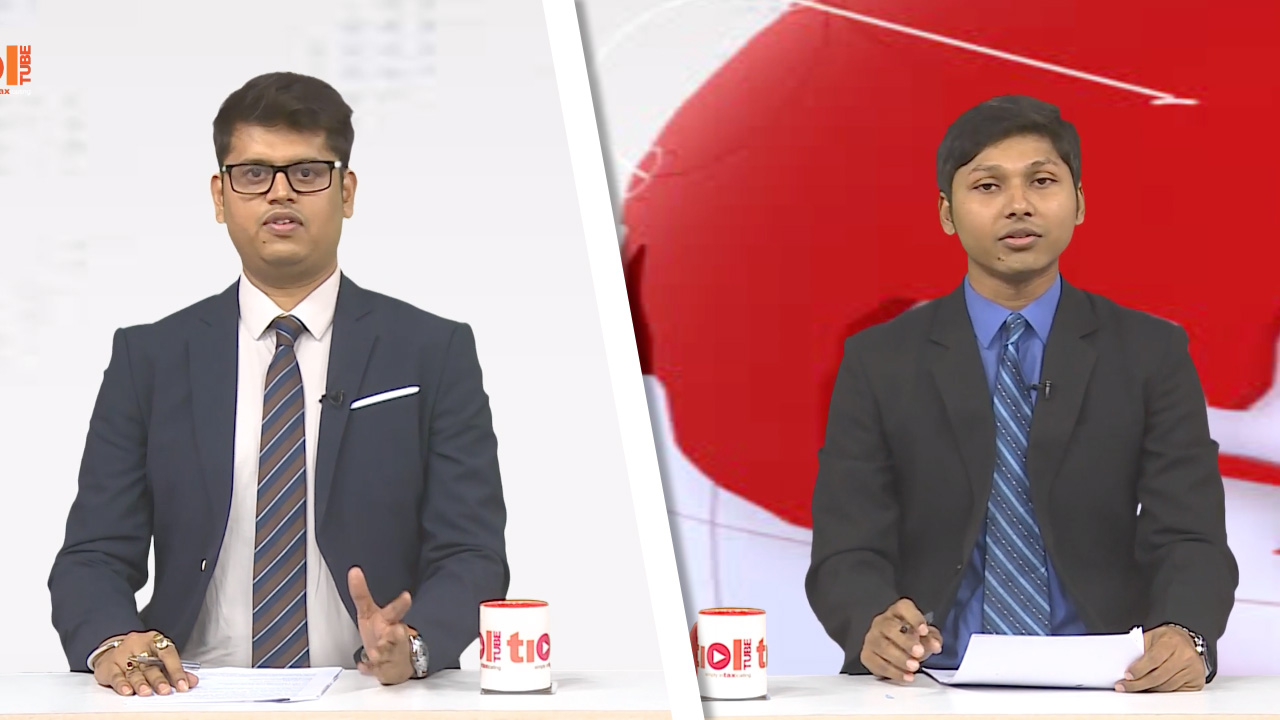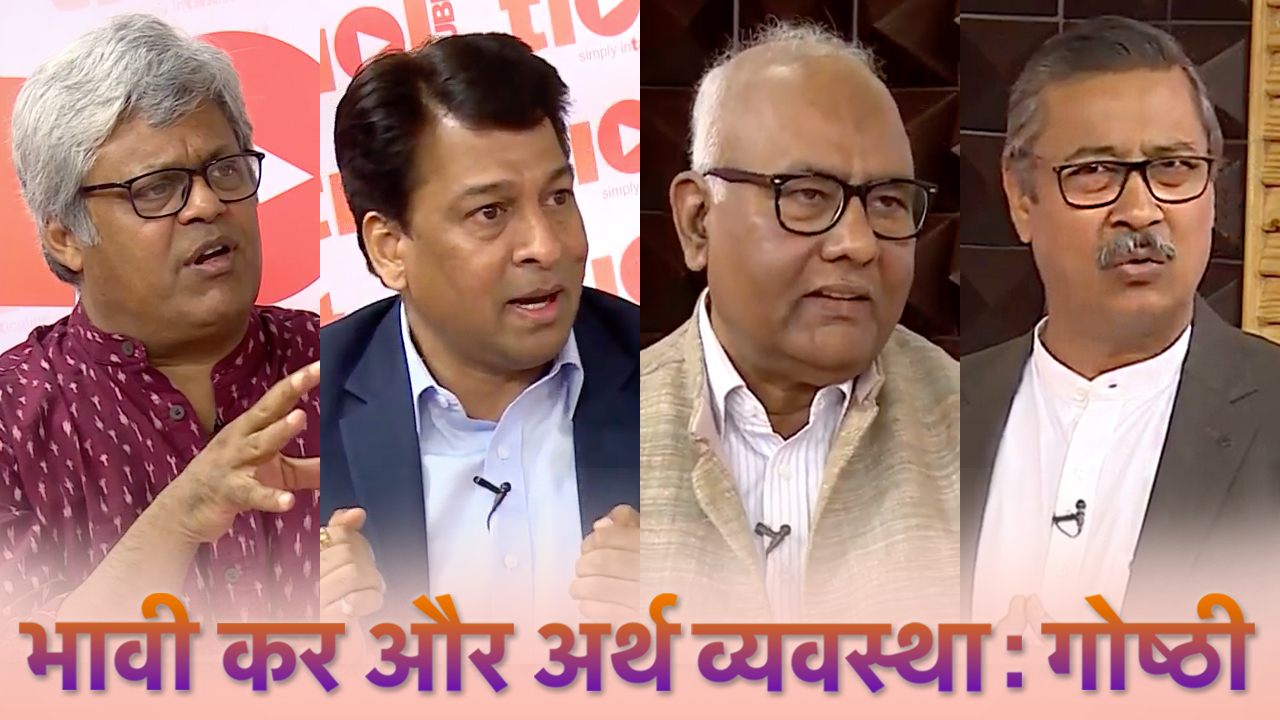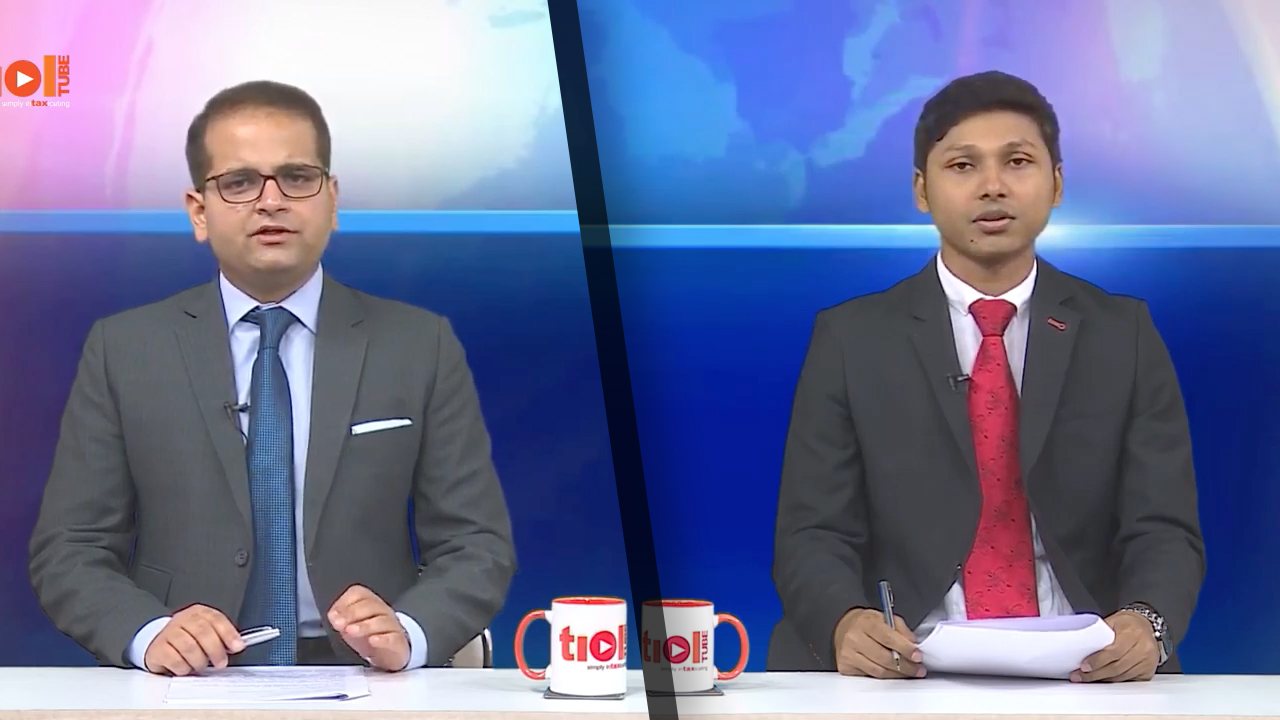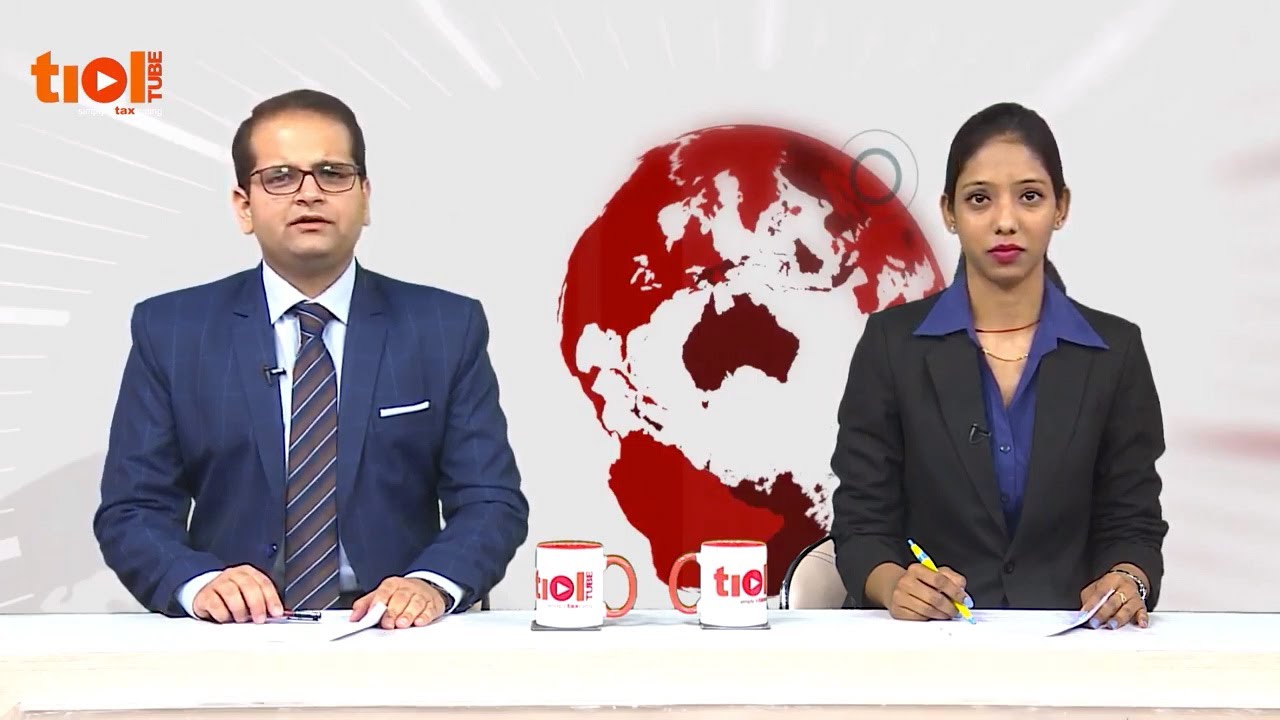|
SERVICE TAX
2019-TIOL-918-HC-MAD-ST
B Ramadass Vs UoI
ST - Petitioner is a Class-I road contractor engaged in laying or relaying of roads for PWD and other local corporations based on the contracts awarded by the Government organizations or undertakings - vide impugned SCN dated 12.5.2009, the second respondent informed the petitioner that the services undertaken by him are covered under "Management, Maintenance and Repair Services" and are liable for payment of ST under the provisions of Finance Act, 1994 during the period from 16.6.2005 to September 2008:
Held : Similar matter has been dealt with by this Court in W .P. No.5156 of 2012 and W.P. No.6814 of 2011 and both the WPs were allowed based on the provision of section 97 of the Finance Act, 1994, as inserted by Finance Act 23/12 dated 28.5.2012 - in view of the above provision, it is categorically clear that no ST shall be levied or collected in respect of management, maintenance or repair of roads, during the period from 16.6.2005 to 26.7.2009 (both days inclusive) - since the services of the petitioner would not fall under the definition of section 65(105)(zzza) of the Finance Act, 1994, he is exempted from the ST payable during the period from 16.6.2005 to 30.9.2008 for which ST has been claimed from him - accordingly, this writ petition is allowed and the impugned SCN is quashed : HIGH COURT [para 9, 10, 11]
-Writ Petition allowed
:
MADRAS
HIGH COURT
2019-TIOL-1193-CESTAT-MAD
Cotton City Developers Pvt Ltd Vs CGST & CE
ST - The appellant-company is engaged in construction of residential complexes - SCN was initiated against the appellant, raising duty demand under Construction of Residential Complex Service u/s 65(91a) of the Finance Act 1994, along with interest & imposition of penalties - On adjudication, the demands & penalties u/s 76 & 77 were confirmed - On appeal, the same was upheld by the Commr.(A) - Hence the present appeal.
Held - It is seen from the O-i-A that the appellant, even before the Commr.(A) argued that the contracts were of the nature of works contract involving supply of material & service - However, the Commr.(A) held that the appellant could not claim the service as coming within WCS & it could not be interpreted as being a new entry - The reliance placed by the Revenue upon the decision of the Apex Court in M/s. G.D. Builders Vs. Union of India is erroneous - Besides, the Apex Court in Commissioner of C.Ex. & Cus. Vs. M/s. Larsen & Toubro Ltd. clearly held that composite contracts cannot be vivisected - Besides, in the Tribunal Larger Bench decision in M/s. Bhayana Builders Pvt. Ltd. Vs. Commissioner it was clearly held that value of free supplies is not be included in value of gross amount charged - Hence, the order in challenge cannot be sustained: CESTAT (Para 2,8)
- Assessee's appeal allowed : CHENNAI CESTAT
2019-TIOL-1192-CESTAT-DEL
Boutique Hotel India Pvt Ltd Vs CGST, CC & CE
ST - The appellant-company is engaged in providing services of cab operators, mandap keepers & health club - During the relevant period, the Department observed that the appellant had short-paid some amount of duty - It was noted that the appellant made some payments to foreign service providers for receipt of various services such as advertising & marketing, business auxiliary service & commission to travel agent service - SCN was issued raising duty demand to recover such duty with interest & penalties u/s 76 & 78 of the Finance Act 1994 - Such proposals were confirmed upon adjudication - On appeal, the same was sustained by the Commr.(A) - Hence the present appeal.
Held - The present appeal disputes the penalty imposed on the assessee - The provisions u/s 73(3) of the Finance Act use the term 'shall' - Thus, the Legislature mandates that if duty is unpaid or short-paid, the Department mandatorily does not have to serve SCN upon the assessee - It is also seen that the entire duty was deposited with interest - This is acknowledged in the SCN - Thus the entire payment is made before issuance of SCN - Hence there is no reason to deny benefit u/s 73(3) to the appellant - Besides, the Department laid emphasis on provisions of Section 73(4), perusal of the SCN reveals that provisions of Section 73(4) were not invoked - It is settled law that the Department cannot travel beyond the contents of the SCN - Mere non-payment or short-payment of tax for a particular period even till time of audit is insufficient to prove grave allegations as contained in Section 73(4) - It is the onus of the Department to supply evidence on part of the assessee proving the latter's intent to evade payment of duty - Hence the provisions of Section 73(4) are inapplicable to the present case - Thus the penalty imposed is quashed: CESTAT (Para 1,6,7)
- Assessee's appeal allowed : DELHI CESTAT
CENTRAL EXCISE
2019-TIOL-1191-CESTAT-ALL
Radhey Shyam Gupta Vs CCE & ST
CX - The assessee was engaged in manufacture of Pan Masala containing tobacco which is commonly known as Gutkha under the brand name "VIKAS" and "SIMOGA" allegedly with the help of two pouch packing machines (FFS) from some part of the premises - Physical stock taking of raw material and loose gutkha was found lying at the premises where the said two FFS machines were found installed - The search of other two halls situated near the registered premises of assessee resulted in detection of raw materials and packing materials of "VIKAS" and "SIMOGA" brand gutkha - The premises which were rented out to the assessee were not the premises where two pouch packing machines were found by the officers - On the basis of various submissions made by assessee, the two pouch packing machines were found in the premises rented out to M/s Gaurav Enterprises and M/s Anandeshwer Enterprises - Further, revenue could not establish any evidence to establish manufacture of Gutkha by assessee and could not establish clearance of the same and therefore, invoking Sub-rule 2 of Rule 17 of said Rules, 2008 for fastening liability on the assessee from 1st July, 2008 is not tenable in law - It is provided in explanation to Rule 18 of the said Rule, 2008 that the goods shall be held to be manufactured with the aid of packing machines if they are cleared from the factory where the pouch packing machine are found installed - Said provisions are not invokable because revenue could not establish beyond doubt that the premises which was under the control of the assessee through rent agreement were the premises in which two pouch packing machines were found - The impugned order is set aside: CESTAT
- Appeal allowed : ALLAHABAD CESTAT
2019-TIOL-1190-CESTAT-DEL
Jovex International Vs CE, GST
CX - M/s Jovex International is a partnership firm comprising of 2 partners Mr. Ankit Valecha and Mr Anshul Valecha, engaged in manufacturing toiletries and cosmetics - M/s Hindustan Perfumers is sole proprietorship concern of Mr. Anshul Valecha and is engaged in manufacture and sale of cosmetics which are excisable and subject to payment of excise duty under section 4A (MRP) - The period of dispute is 1.5.2008 to 23.9.2012 - Mr. Sunil Valecha is the Director of M/s Zever Marketing Pvt Ltd., a trading concern - The manufacturing firm- Jovex and H.P. were availing SSI exemption - It appeared to revenue that the appellants are clearing the manufactured goods which are dutiable, without getting themselves registered with the department and without paying appropriate duty leviable - The whole case of Revenue is based on kacchi parchi/loose slips, recovered from ZMPL - Such loose slips have not been made RUD - The MRP mentioned on the samples drawn was correlated with the sale price mentioned on invoices raised by appellant to ZMPL - In view of said Khacchi parchi/ loose slips not made RUD, the whole case of clandestine removal falls for want of sufficient evidence - There is no enquiry made with respect to manufacturing capacity and the alleged clandestine removal - There is no enquiry made with respect to receipt of sufficient packing material although the supplier of packing materials - Talman Containers was located at the same plot where JI is situated - Revenue has failed to take notice of records of production maintained mandatorily under provisions of Drugs and Cosmetics Act, 1940 - Further there is no evidence of transport of such goods alleged to be clandestinely removed, nor the evidence of receipt of inputs/raw materials for manufacture of such alleged finished goods cleared clandestinely - ZMPL being a trading concern have not committed any illegality in dispatching goods on the basis of delivery challan - The estimation of turnover by Revenue on the basis of MRP is erroneous - For the purpose of SSI, the actual transaction value of the clearances is relevant - It is only for the purpose of calculation of duty, that MRP is taken as base and abatement allowed as notified - The mistake of fact committed by Commissioner in the impugned order by treating the recovery of Kacchi parchi from possession of Mr Ankit Valecha, whereas it is evident from SCN and the punchnama that the said Kacchi parchi were recovered from Mr Sunil Valecha, Director of ZMPL - Accordingly, impugned order is unsustainable for the lack of sufficient evidence and mistake of fac - The confiscation of temp valued at Rs. 1,57,500/- is also set aside: CESTAT
- Appeal allowed : DELHI CESTAT
CUSTOMS
2019-TIOL-917-HC-MUM-CUS
UoI Vs Bhavesh Jayantilal Shah
NARCOTICS Drugs and Psychotropic Substances Act, 1985 [NDPS Act] - The UOI through Intelligence Officer, DRI has filed this writ petition under Article 226 r/w 227 of Constitution of India wherein the order dated 29.10.2018 of Special Judge, NDPS releasing the respondents/original accused nos. 1 and 2 under section 169 of Cr. P.C. is challenged:
Held : The issue raised in this Application is whether the Application made by the Prosecutor under section 169 of Cr. P.C. can be treated as Application made under section 321 of Cr. P.C - in the present case, it is unambiguous that the Application is made under section 169 of Cr. P.C. - in section 169 of Cr. P.C. the discretion to make such Application is left to officer in-charge of the police station and he may release the accused on his executing a bond with or without surety and may direct to appear if and when so required - the order passed by the Magistrate is based on misconception of law and is ex facie illegal considering the scope of sections 169 and 321 of Cr.P.C. - sections 169 and 321 of Cr.P.C. cannot be substituted for each other - they can be invoked in different circumstances and the Court's power after invocation of these two sections are not the same and, therefore, it is a fit case to be entertained under writ jurisdiction - the Application moved by the Prosecutor under section 169 is illegal and so the order passed therein, it should go - however, it appears that the Prosecutor has moved this Application bonafide, having different interpretation of the notification dated 13.7.2018 - thus, the following order is required to be passed: (i) the order is set aside (ii) the prosecution is given two weeks time to file complaint - delay is condoned (iii) the status of the respondents is restored as accused in the said case (iv) the respondents/accused are already out of the prison and therefore, in all fairness, no coercive action is to be taken against them for a period of one month from the date of the filing of the complaint (v) the respondents/accused shall move an application for bail before the Special Court and the Special Court to decide that Application of bail on merits in accordance with law : HIGH COURT [para 6, 11, 18, 19, 20] -Writ Petition disposed of
: BOMBAY HIGH COURT
2019-TIOL-1201-CESTAT-MUM
Tata Motors Ltd Vs CC
Cus - Limitation - Section 28 of the Customs Act, 1962 - Allegation is that the appellants have been claiming wrong benefit of notification 21/2002-Cus (Sl No. 190C) on their import of steel coils inasmuch as they were importing alloy steel and mis-declaring the same as non-alloy steel - matter remanded by High Court on the short issue of limitation as issue of classification has already been decided by the Bench of the Tribunal at Ahmedabad in favour of Revenue - Appellant has contended that the matter is a complex one and appellant had entertained a genuine doubt about the correct classification of the impugned goods; that the fact that two members had differed and the issue was resolved only by referring the matter to the Third Member shows the complexity of the issue.
Held: Appellants had since 29 April 2008 filed more than 150 Bill of entries for which they had allegedly wrongly claimed the benefit of exemption notification 21/2002-Cus - however, admitting their mistake, appellants had deposited the differential duty due in respect of all the said bill of entries in November and December 2018 - It is quite evident that the earliest date of examination in respect of the Bill of Entries for which appellants have claimed that the demand is beyond the normal period of limitation as prescribed by s.28 is 12.05.2008 - in terms of s.28, the period of limitation which has to be within six months from the date on which the proper officer makes the order for clearances of goods would be some date after 12.05.2008 since examination precedes the order for clearance of goods - appellants have themselves admitted the error and have proceeded to pay the duty and since the duty has been paid in respect of these clearances in November and December 2008, the demand was not time barred on the date of payment - therefore, proceedings initiated by SCN dated 01.01.2009 cannot be said to be time barred - when the appellants have themselves admitted the differential duty liability and have paid the same within the prescribed period of limitation u/s 28, they should be estopped from taking the ground of limitation in subsequent proceedings - in case, the appellants intended to disagree with the duty demanded, instead of paying the same, they should have asked the department to issue a SCN - thus, even if the appellants argument that the extended period of limitation cannot be invoked in the present case is admitted, even then the demand cannot be held to be time barred as all the amounts had been paid prior to the expiry of normal period of limitation - Appellant, being an ACP status holder, goods are cleared on the basis of self assessment - When the Government confers ACP status, it is based on trust which government imposes on such importer - it imposes additional responsibility on the status holder to make correct and complete declaration - even otherwise if the declaration made at any time is found to be incorrect, the charge of misdeclaration is a natural consequence - appellants have misdeclared the goods imported to the extent of claiming benefit of exemption not admissible - ingredients required for invoking the extended period of limitation as provided u/s 28 are satisfied - mandatory penalty u/s 114A of the Customs Act, 1962 is justified - order of the adjudicating authority is modified to the extent of setting aside the redemption fine of Rs.2.46 crores imposed in respect of the goods not available and which were not even seized - appeal is partly allowed: CESTAT [para 6(iv), 9, 10.4, 10.10, 10.12, 12] - Appeal partly allowed
: MUMBAI CESTAT 2019-TIOL-1200-CESTAT-MUM
Knowledge Infrastructure Systems Pvt Ltd Vs Additional Director General Directorate of Revenue Intelligence
Cus - Valuation - Casual dismissal of application of rule 5 and 6 of the Customs Valuation Rules, 2007 is contrary to the provisions of law - There is no allegation of any legally recognized relationship between the Hong Kong entities and the importer - investigation is bereft of any confirmation, circumstantial or otherwise, of transaction by the Singapore subsidiary with M/s International Metallurgical Resource, AG and any inquiry with the agencies that tested the samples at the load port - determination of a value without sequential application of the Customs Valuation Rules, 2007 with valid justification for bypassing rule 5 and 6 f the said Rules is not tenable - in the absence of a validly determined value, the breach for invoking section 111(m) of the Customs Act, 1962 is not established and in the absence of goods that are yet to be cleared for home consumption, there is no scope for invoking jurisdiction to hold the goods liable for confiscation - liability to confiscation and the imposition of penalty rest upon the finding that the chain of transactions, prior to that declared for assessment, had incorporated the intermediaries to enable concealment of the quality, and thereby the value, of the coal sourced by M/s IMR Metallurgical Resource AG - adjudicating authority has, unabashedly, placed a premium on the integrity, reliability and reputation of M/s IMR Metallurgical Resource AG, however, no background narrative has been offered for this encomium - Credibility is not a matter of degrees; it is absolute - No amount of dissembling can lead to acceptance that this amenable to measurement and a higher measure should receive judicial sanction for the credibility of one suspect report over another - Tax Tribunal cannot be swayed by the sentiments to overlook the inadequacy of evidence to accept the documentation on which the impugned order has placed reliance on and the surmises emanating from the unfilled gaps in the tale - Circumstantial evidence has limited acceptability and preponderance of probability must be preceded by established probability - It is surprising that M/s Mahagenco Ltd. who were allegedly the victims of short-changing in the supply of inferior coal were not put to the test of the energy generated from the coal - More coal would have been required for energy levels sought with use of the coal contracted for import if calorific value was 'off spec' - consumption of coal and the energy generated appears to have been overlooked - that would have been the surest test, the easiest determinant and most discrediting to claimed ‘gross calorific value' - findings in the impugned order cannot be sustained, hence the same is set aside and the appeals are allowed: CESTAT [para 40, 41, 43, 45, 46, 47, 50, 55]
- Appeals allowed
: MUMBAI CESTAT
2019-TIOL-1189-CESTAT-HYD
Universal Biofuels Pvt Ltd Vs CC
Cus - The assessee is an 100% EOU set up as per LOP - On 14.11.2008, the assessee sought permission from Development Commissioner VSEZ to debond from 100% EOU scheme and switch to EPCG Scheme in terms of para 6.18 (e) of FTP 2004-2009 - The 'In Principle' approval for switching over from EOU to EPCG Scheme was issued on 20.11.2008 - The Superintendent of Central Excise had initially raised an objection vide his letter stating that the conversion is not permitted as assessee has not achieved the positive NFE - The Superintendent of Central Excise issued an NOC for conversion and permission was granted by Commissioner of Central Excise on 22.06.2009 - Based on such permission, on 25.06.2009, the final exit from EOU Scheme was approved - This chronology of events shows that Customs and Central Excise authorities were fully aware of the activities of EOU including the alleged non achievement of positive NFE, as indicated in the Superintendent's letter dated 26.03.2009 - Under these circumstances, nobody can claim that assessee has suppressed any facts or has imported any goods in violation of any notifications - If assessee has, as alleged, not achieved the positive NFE, this fact was noticed by Department before permitting the assessee to switchover to EPCG Scheme - Almost six months after the final exit of assessee from EPCG Scheme, the SCN was issued by Commissioner on the same issue - The amendment to notfns 22/2003-CE and 52/2003-CE were effective from 11.04.2008 well before the department permitted the assessee to switchover to EPCG Scheme - There is nothing on record to show fraud and that the officers being aware of legal provisions and that the assessee has allegedly not fulfilled the NFE requirements, have fraudulently permitted them to switch over to EPCG Scheme - Otherwise the concerned Officers who would have been put to notice for the fraud - The final decision regarding any license issued by DGFT or Development Commissioner rests with such authority - Once the final exit has been given by Development Commissioner, Customs has no authority to re-open the matter - The impugned order demanding customs and central excise duties invoking extended period of limitation and proposing confiscation of goods and imposing of penalties is without any merit and the same is set aside: CESTAT
- Appeal allowed : HYDERABAD CESTAT
2019-TIOL-1188-CESTAT-MUM
Western Cans Pvt Ltd Vs CC
Cus - Lower authorities held that import is permissible of 'lining compound' as per the licence but the impugned goods were 'can sealing compound' which is an entirely different goods; that they are not entitled for exemption under notification 43/2002-Cus and liable to differential duty as well as confiscation but permitted to be redeemed on payment of redemption fine - appeal to CESTAT.
Held : Test report of the Deputy Chief Chemist, upon perusal, displays lack of expert analysis of the two rival descriptions and that the product data sheet and literature alone has led to the conclusions which also appear to be no less tentative - impugned order being in error is set aside and appeal is allowed: CESTAT [para 4, 5]
- Appeal allowed : MUMBAI CESTAT
2019-TIOL-1187-CESTAT-KOL
Bharati Sen Vs CC
Cus - The assessee was posted as Inspector of Central Excise and Customs at Changrabandha Land Customs Station at the border of Bangladesh in the State of West Bengal - The assessee has filed the appeal against imposition of penalty under Section 114 of Customs Act, 1962 - The Adjudicating Authority observed that assessee had abetted/colluded with exporter, M/s Preetam Marketing Ltd. by contravening the provisions of Customs Act, 1962 and also failed to discharge duty properly as laid down under Customs Act, 1962, for the purpose of scrutiny of Bills of Exports and examination of goods and assessee is liable to penalty under Section 114 of Customs Act, 1962 - The facts and circumstances of the present cases are squarely covered by decision of Tribunal in case of Suvasis Banerjee & Others - Therefore, the imposition of penalty under Section 114 on assessee is not justified - The penalty imposed on assessee is set aside: CESTAT
- Appeal allowed : KOLKATA CESTAT |











